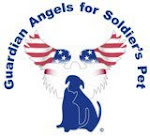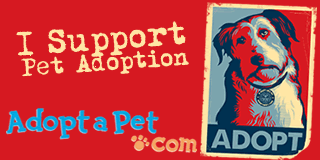Click the title for a message from the ASPCA about pets and swine flu. Here is some info from their site:
Pet parents of dogs and cats can relax for now, say ASPCA veterinarians. While the 2009 H1N1 virus—a faster moving and possibly more debilitating strain of influenza than the typical seasonal flu—has become an international concern, the virus, referred to as swine flu when first identified, appears to present little risk of infecting dogs and cats. However, viruses can mutate quickly and taking important preventative measures remains essential.
“Many species can become infected with influenza viruses, but the current 2009 H1N1 virus, which is a mixture of genetic material from different species, has not been identified in animal populations in the United States to date,” says Dr. Miranda Spindel, Director of ASPCA Veterinary Outreach. “These viruses are notoriously unpredictable, though, and it is important that we remain vigilant.”
In terms of other animals who are susceptible, Dr. Spindel warns that influenza or flu viruses are occasionally transmitted from people to pigs, and the 2009 H1N1 virus has also been identified in turkeys. Pet parents of Vietnamese Potbellies, African Pygmies and other pet pigs should monitor their animals' health closely, notify their veterinarian of any signs of illness and speak to their veterinarian about influenza type A vaccines. And ferrets are susceptible to most human flu viruses, so pet parents should take extra care to prevent exposure of pet ferrets to people or other ferrets with flu symptoms.
Meanwhile, flu season is upon us and pet parents should take common-sense preventative measures to keep their dogs and cats healthy:
•If your dog is exhibiting flu-like symptoms, including coughing, nasal discharge or fever (normal dog and cat temperature is 101 to 102.5 degrees), play it safe and avoid taking him to places like dog parks, where he can pass on germs or come into contact with unvaccinated or sick dogs.
•Avoid letting your cat roam freely outside.
•If your dog comes into frequent contact with other dogs or is kept in a kennel, the ASPCA recommends that you discuss with your veterinarian whether vaccination against canine influenza may be appropriate. Note: canine influenza and H1N1 are not the same virus.
•Talk to your vet about what flu vaccines are currently available, and be sure all your pets get vaccinated!
•Don't let your pet share water bowls, food dishes or toys with other animals.
•Make sure your pet is eating, drinking and playing as he normally does each day. If you notice your pet behaving unusually, or if he has flu-like symptoms, check in with your veterinarian immediately.
xoxo
skip to main |
skip to sidebar
A good dog is an oasis in a troubled world.

St. Francis, Patron Saint of this blog



A blog that advocates for shelter dogs and animals in general
Now more than ever, you are needed to donate your old blankets, towels, and sheets to your local animal shelter. With financial cut-backs, repairs on shelters are often put off, so if it's drafty, the animals suffer. I know my shelter uses rags to stuff under doors. No kidding! Empty out those closets... this is your chance to get rid of stuff and do something useful!
Choosing a dog may be the only chance you have to choose a relative!
Followers
Got Soldier? This group fosters their pets while they are deployed!
A good dog is an oasis in a troubled world.
ANIMAL POISON HOTLINE
Save this number!
1.888.232.8870
Save this number!
1.888.232.8870

St. Francis, Patron Saint of this blog
Search This Blog
Good Orgs
Good Search
YOU SEARCH OR SHOP...
WE GIVE!
WE GIVE!
Blog Archive
-
▼
2009
(149)
-
▼
October
(40)
- Halloween Pics
- News Round Up
- What Would You Do For A Pigeon?
- Pet Talk: Pair's Wonderful Way With Disabled Anima...
- Cool Dachshund Video
- Halloween Events For You and Your Dog - NYC and LI...
- Keep Animals Out Of Labs or Regulate Sales to Thos...
- A Lousy Day
- Low Cost Spay/Neuter Mobile Clinic for cats, Oct. ...
- Victories And Disappointments
- Play Gone To The Dogs
- Two Good Adopt-A-Pit Bull Stories, in Honor of Pit...
- Charlie (the formerly blind Beagle) Gets Adopted F...
- Pit Bull Awareness Day - October 24th
- News Round Up
- Ennis, Texas Rescue Group Closing - Homes Needed F...
- Award Goes to ASPCA Forensic Vet for Work on Vick ...
- Pit Bull Event, Oct. 24th, in New Haven CT
- A Great Rescue Story via Rolling Dog Ranch (in bea...
- I'm sitting working on the blog and look who ge...
- Book Reading in Woodside, NY - "Buddy Unchained"
- Almost Home Animal Rescue and Adoption WALKATHON i...
- Adoption Event in Melville, NY Benefitting Little ...
- WHAT A GREAT EVENT! Sugar Bush Farms - Out Of The...
- Adopted!
- News Round Up
- Dog Saves Family From Fire
- Funny Dog Pics
- Cat Food Recall
- Two Adoption Events This Week
- New York Week For The Animals (Oct. 10-18th)
- Adopt a Little New Yorker Today
- Pilots N Paws -- another one for "Thank-God-This-E...
- US Marines Conduct Behavior Assessments As An Alte...
- News Round Up
- Day At The Shelter
- Another Good One From Rolling Dog Ranch
- Danny Bampton
- Westchester Pet Adoption Fair & Expo
- Can Cats and Dogs Catch Swine Flu?
-
▼
October
(40)

About Me

- dellbabe68
- To sit with a dog on a hillside on a glorious afternoon is to be back in Eden, where doing nothing was not boring - it was peace. ~Milan Kundera











